Why money, education and tolerance are needed in California’s upcoming ban of gas blowers
Climate change is global but the actions we take here in Sacramento play a role in shaping our environmental future. The Sacramento Bee is undertaking a collaboration with you to examine and celebrate bold and ambitious climate actions that have yielded evidence that they’re making progress here and elsewhere. The goal is to engage you and your neighbors in a hopeful discussion about how we can face climate change with urgency and equity.
Rafael Guzman’s first request to use battery-powered landscaping equipment came six years ago.
He immediately rejected the idea. Guzman had spent the prior 32 years revving up gasoline-powered machines without hesitation. His job was to leave lawns looking pristine. Pollution was a byproduct and afterthought.
Plus, he wondered about the effectiveness of such equipment and figured its increased costs wouldn’t be worth saving one customer.
But the customer was intent not to lose Guzman. After some persistent haggling, the two men settled on a compromise. Guzman would continue using his gas-powered equipment, with the exception of one electric-powered leaf blower.
“If he asked for more, I would stop doing his house,” Guzman said.
Since that first request in 2017, the demands for zero-emission landscaping work have increased. This year, two more customers asked Guzman, 57 and a native of Jalisco, Mexico, to transition his tools. Their minds changed after Guzman said new equipment would require doubling his monthly charge from $120 to $240.
These requests are only expected to grow in the coming years as California moves toward its goal of phasing out gas-powered lawn care equipment. Starting in 2024, the sale of new gas-powered blowers, mowers, weed trimmers and chainsaws will be banned — yet another step by the state to reduce harmful pollutants and transition to 100% clean energy by 2045.
Amid these new regulations and growing demand from customers, landscape workers remain skeptical.
“There’s also a lot of confusion,” said Fulgencio Vazquez, a manager at Del Sol Landscaping in Sacramento. “Many think that the law is not going to be possible and the government is going to change it. Others are annoyed at the change because they know the equipment.”
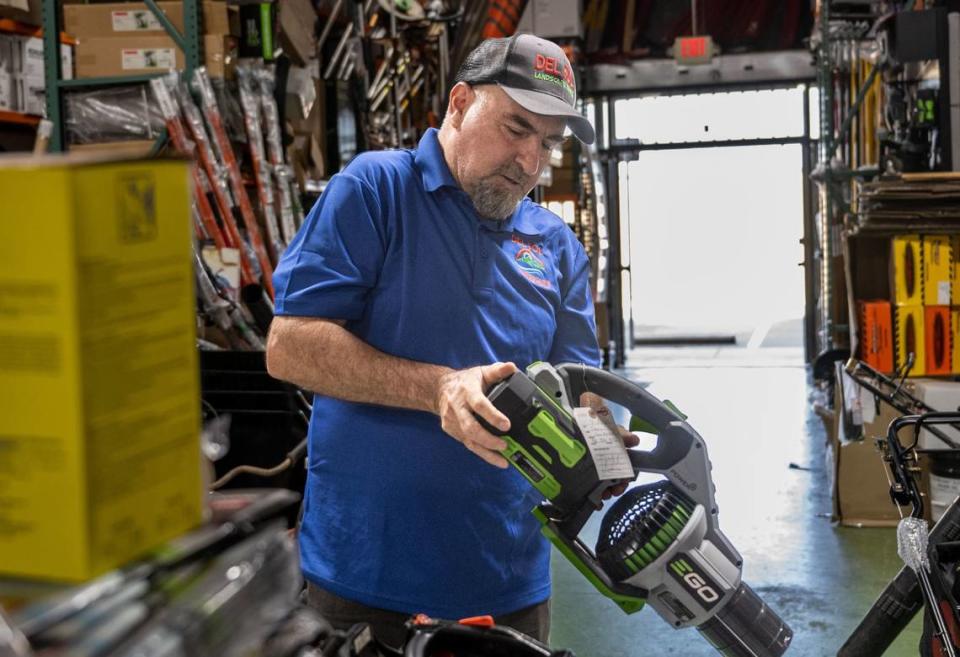
Guzman still only owns one compact electric leaf blower and two batteries. He doesn’t plan to buy more battery-powered equipment any time soon — a sentiment shared by many small business gardeners.
But those same workers will be the ones most affected by the upcoming ban. Their views are rooted in some truth — high costs and varying effectiveness— and a reluctance to adapt. In many cases, they are single persons or small crews, and often Latino immigrants who will require assistance to transition tools.
“The people most affected are going to be the Latinos that don’t have a big business,” Vazquez said.
That reality has led to some organizations and people to begin sharing the burden of electrifying the lawn care industry. Through continued financial and community support, there may be an eventual willingness to adopt landscaping technology better for the environment.
The goal, however, will require attitude adjustments by both gardeners and their clients.
What will convince gardeners to transition to zero-emission tools?
California will begin banning the sale of gasoline-powered landscaping equipment next year, but workers remain skeptical of electric machines despite their many health benefits. Here’s what to know about the transition.
Starting Jan. 1 2024, the sale of new gas-powered blowers, mowers, weed trimmers, chainsaws and power washers will be prohibited statewide.
The estimated 51,000 one-man businesses, many of which are Latino immigrants, are likely to be most affected by the ban. Their main concerns relate to the cost and performance of electric equipment.
Help for gardeners to transition is still in the early stages, with incentive programs that discount tools and outreach to inform them that electric tools set workers up for long-term success.
Grassroots efforts may also be key to a successful statewide transition. Some homeowners are buying their gardeners electric-powered equipment and others are paying more.
In the long-term, both gardeners and clients will need to compromise. Workers will need to adapt to the new equipment, and homeowners to less pristine lawns.
Why change to electric landscaping equipment?
The approved ban had been a long time coming for some California homeowners. They view the gas powered machines as an evil combination of loud and dangerous.
Science supports that point of view.
Operating a commercial gas-powered lawn mower for an hour emits as much pollution as driving a 2016 Toyota Camry about 300 miles, according to the California Air Resources Board. And for a leaf blower, an hour of operation produces the equivalent emissions of driving the car 1,100 miles.
“As California continues to grapple with having the nation’s worst air quality, transitioning key sources of pollution such as gas-powered landscaping equipment is essential to achieving a clean air future,” said Lynda Lambert, a spokeswoman with CARB.
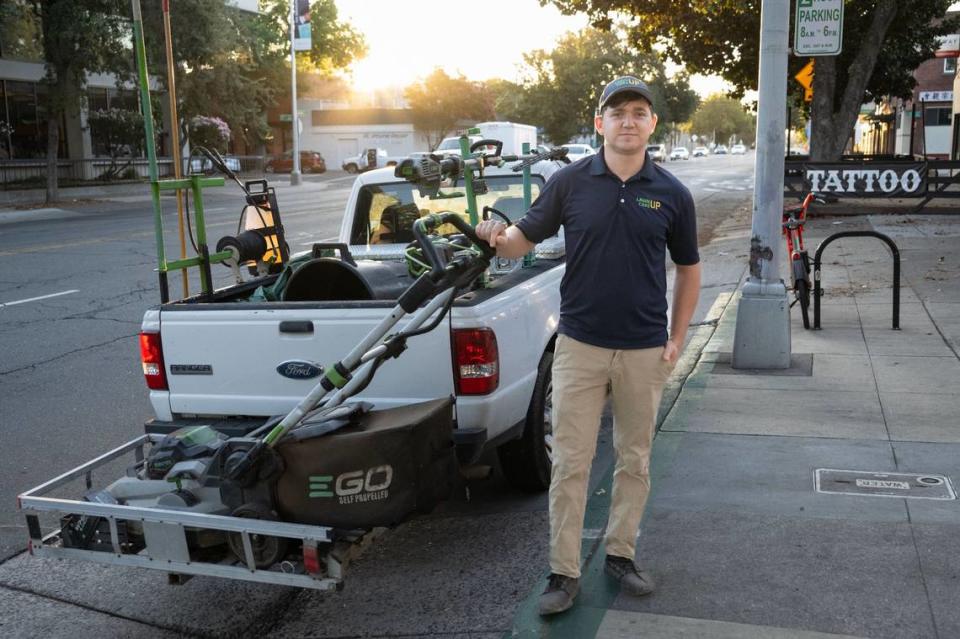
The new restrictions are expected to reduce smog-forming emissions by 72 tons per day. And more importantly, over the next 20 years, it’s estimated to avoid 900 premature deaths.
Noise levels from these engines also cause hearing loss, said Anthony DeRiggi, a retired physician and member of the Sacramento County Environmental Commission. He added that recent medical research has shown increased risk of cardiovascular disease, such as hypertension and stroke, in people exposed to loud episodic noise.
“These workers here in California are often recent immigrants who live in disadvantaged communities, so this is an environmental justice concern, along with the concern for the entire community exposed to noise and pollution,” DeRiggi said.
High noise levels are insidious to residents, too, who can face long-term damage while are also routinely subjected to the intrusion of their neighborhood soundscape. One-quarter of Americans ages 20 to 69 who reported good to excellent hearing actually have measured hearing damage, according to a 2017 report from the Centers for Disease Control and Prevention. This is caused by prolonged exposure to noise above 85 decibels such as blowers, mowers, sporting events and concerts.
What makes the transition to electric difficult?
Though beneficial, electrifying the landscaping industry will undeniably create financial and work burdens for the estimated 51,000 one-person businesses in California.
First, it’s not cheap. A full statewide transition of the nearly 3 million tools used by landscaping professionals is projected to cost $1.29 billion. Individually, electric equipment can cost up to two or three times as much as their comparable gas version.
At Del Sol Landscaping, Vazquez said a larger backpack leaf blower with sufficient batteries costs up to $2,000. Its gas counterpart is priced around $500.
Owning sufficient batteries furthers cost concerns. Buying extra — often expensive — batteries will likely be needed for each piece of equipment.
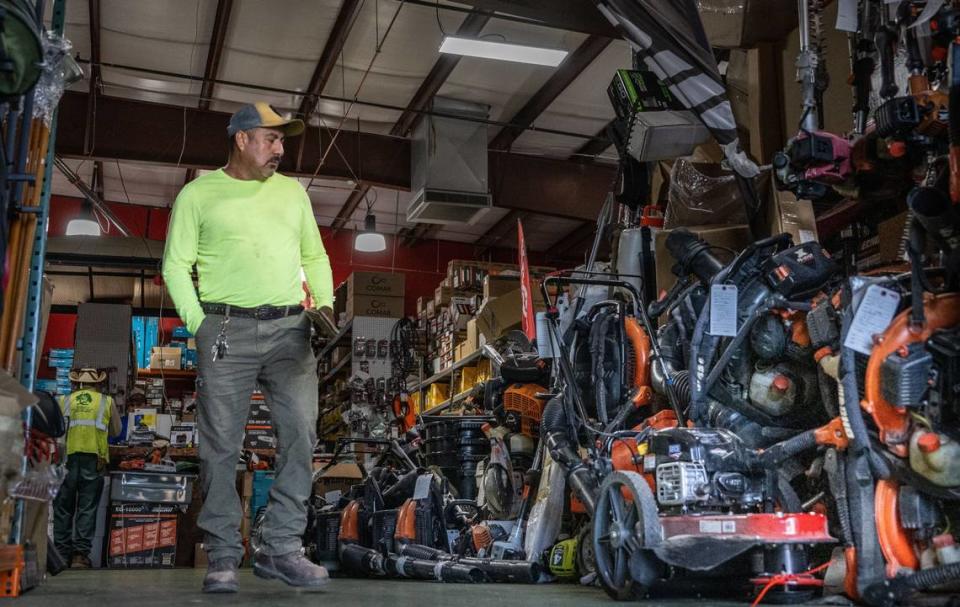
Some electric blowers used at full blast only last 30 minutes before needing a battery change, said Vasquez. He estimated one gardener might need between eight to 10 batteries for a full day’s work.
“The only ones that are going to survive are the people with big businesses,” Guzman said.
Performance and efficiency questions lead to more doubts for workers.
Not having enough power with the electric equipment is a frequent complaint among workers. Others express dislike of the heavier-weight blowers on their backs or having to hold less powerful machines.
Like many in the industry, Guzman believes battery-powered equipment just doesn’t stand up to its gas counterparts. He estimated only completing three houses a day using solely electric equipment. Guzman typically works on 20 homes each day.
“It takes longer because the machines don’t have the same potential,” Guzman said.
That is somewhat true.
In most cases, electric and gas powered equipment exist that are comparable. Some blowers are the exception, with workload production falling between 15-20% for the battery-powered versions, according to Daniel Mabe, the founder of the American Green Zone Alliance.
As for costs, Mabe said electric tools set workers up for long-term success as they would no longer have gas costs. The key is to care for the equipment and make it last at least three years. Then, the cost of operation becomes “more profitable.”
“The way the technology stands now, it’s good enough to where, if programs can get workers the battery bank that they need, they can definitely make it work in most situations,” Mabe said. “But again, they’re going to have to have that help.”
How are environmental organizations trying to help gardeners transition?
Help for gardeners to make the transition is still in the early stages with individuals such as Mabe leading the way.
His company has spearheaded workshops, training and certifications to help people transition to lower-impact landscaping since 2014. Last year, American Green Zone Alliance was contracted by CARB to help with outreach with an emphasis on Spanish-speaking small businesses and independent operators.
The outreach consists of events where landscapers can test equipment and workshops about statewide incentives programs. CARB has also run ads on Spanish-language radio stations across the state to provide information about the upcoming transition.
Education is key to convincing veterans of the industry who may be more reluctant to the change, Mabe said.
“They need credible, pertinent information and education to help them with their business models and to make sure that they’re maximizing all of their opportunities,” Mabe said.
On a recent Sunday in August, Mabe and zero emission landscaping vendors set up at Sacramento’s Southside Park for an outreach event. One of the main goals is to inform workers of California’s $27 million Clean Off-Road Equipment Voucher Incentive Project (CORE).
The program started in November 2022 and offers up to 70% discounted electric equipment for small businesses or sole proprietors, which account for 99% of the landscaping businesses in the state. To apply, workers need a drivers license, business card or reference from a dealer. Eligible equipment includes leaf blowers, lawn mowers and string trimmers.
“The way the math works out it puts it on a level symmetry with the cost of gas and it takes that initial, much more expensive upfront cost of electric,” Mabe said.
Some local governments in California, through their air districts, also run incentive programs for zero-emission landscaping equipment. In some cases, such as the South Coast Air Quality Management District, the rebates go up to 85% per tool.
Mabe and many across industry agree more money will be needed in the future, particularly for small landscaping businesses. Only $4 million is left in the state’s voucher program, as of mid-August.
“We definitely feel that we’re going to need several years of funding like this,” Mabe said.
Assemblyman Marc Berman, D-Menlo Park, author of the ban legislation, said he has tried to secure more funding through the state budget in the last two years and will continue asking.
How will workers be persuaded?
Funding may be crucial to electrifying the lawn care industry, but it’s only the first step. There’s still the issue of convincing hesitant workers.
Thus far, in Sacramento, the persuasion has been slow, according to local vendors of the state’s CORE eligible equipment.
The Sacramento Bee contacted four of the region’s 10 CORE dealers: Del Sol Landscape Power Tools, Citrus Heights Saw and Mower, Emigh Ace Hardware and Bar-Hein Co. Each one had experienced fewer than five people taking advantage of the discounted equipment. Some had heard murmurs of workers driving across state lines to Nevada and Arizona to buy tools when the ban takes effect next year.
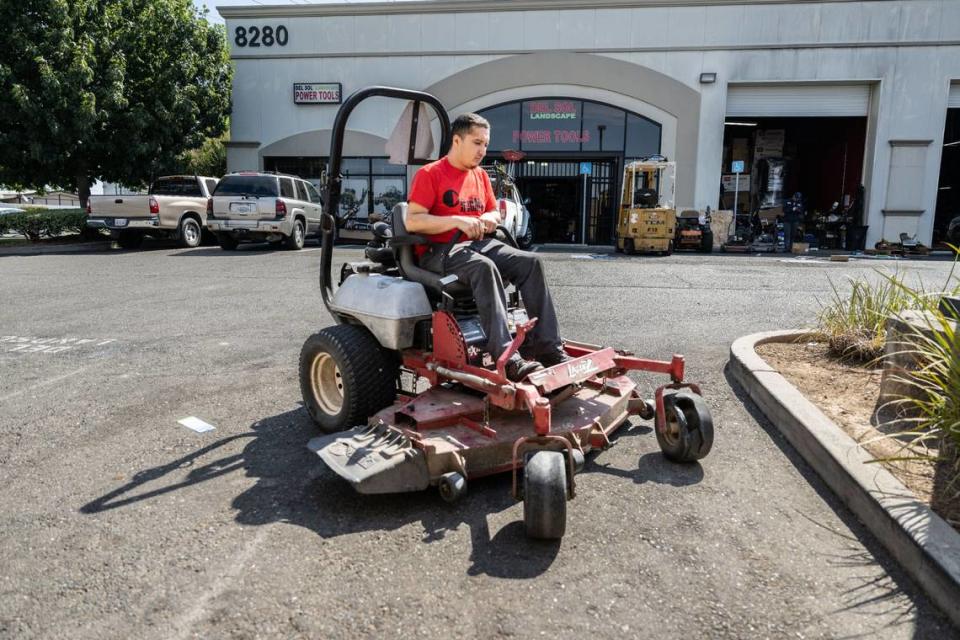
“We’ve only had one participant so far,” said Randy Aspinall, manager at Emigh Ace Hardware. “I’m kind of shocked actually. I thought there would be a lot more people.”
Increased participation in electric may eventually come through the help of grassroots efforts.
United Latinos, a local nonprofit organization, hoped to take a step forward in that direction last year by proposing a pilot program for 10 small landscaping businesses. Its goal was to study the economic and social justice impacts on the businesses by providing a year of support.
The project, estimated to cost $1.5 million, would provide battery-powered equipment, charging stations, stipends to pay higher utility costs for charging batteries daily, tools training and the conversion of gas trucks to electric.
Richard Falcon, a community organizer for United Latinos, said this help would provide a clearer picture on the sustainability of transitioning to electric powered tools.
“Where are the studies that have shown doing these changes will not produce a loss for business?,” Falcon said.
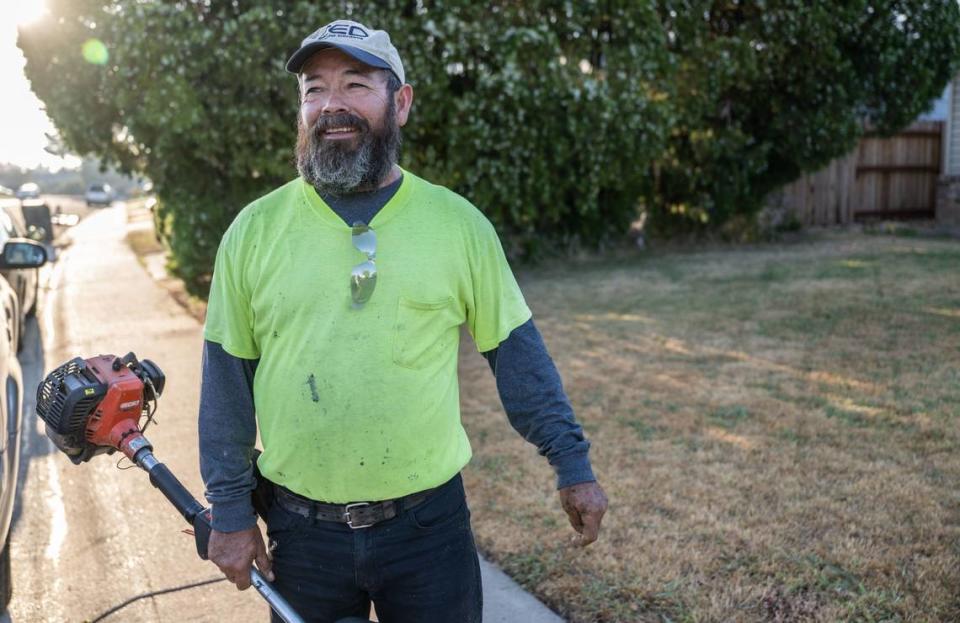
The project ultimately failed to garner full funding or support from the city. Still, it’s a sign of what will be needed from cities and communities to help workers, Falcon said.
People like Sacramento resident DeRiggi are trying smaller gestures. He bought his personal gardener a small, handheld $200 electric leaf blower, citing public health concerns to both the landscaper and environment.
“He assumed it wouldn’t be powerful enough but now I leave the blower out, he uses it and then I recharge it for the next week,” DeRiggi said.
Elsewhere in the city, Kim Alexander is attempting to further that approach. She is the co-creator of Mow Better, a small group of people wanting to help phase out gas-powered lawn equipment.
The group encourages homeowners either to buy their gardeners equipment or pay them more. And perhaps equally important, what constitutes a clean yard is open to discussion that experts and workers say may be vital to a successful statewide transition.
“It’s an issue that requires a whole paradigm shift, so he (my gardener) said the yard is not going to look as tidy and I didn’t care,” Alexander said. “I just didn’t want to be contributing to that problem anymore.”
What will the future look like? It could be a little messier
Sacramento gardener Francisco Mendoza, 38, owns one handheld electric-powered blower. He would never consider using it on Friday, in what he calls his “picky route” day.
“I have a lot of picky people on Friday,” Mendoza said. “They want it really clean, really nice. So it wouldn’t work for them.”
Wednesdays are the opposite. That day, Mendoza has two clients who are willing to pay the extra costs for a battery-powered blower. He typically finishes the day using it, even if he can’t get rid of every leaf. Customers understand some debris might even be left in the planters.
Therein lies a potential compromise.
The expectation of gardeners to leave lawns immaculate is ubiquitous across the industry, Mabe said. Years ago, he even coined a term for the views of those picky customers — aesthetic expectation.
“These are the stresses that all of us are under in the industry to make the clients happy,” Mabe said.
But until now, it’s never been so prevalent. Less power and unfamiliar equipment is certain to affect what and how much can be accomplished in a day.
“If the customers are able to understand that, especially those like my Friday route, then it’ll be easier to transition,” Mendoza said.
Gardeners will also need to make some concessions. Mendoza cited his father and uncles, who also work in lawn care and “hate” the upcoming ban.
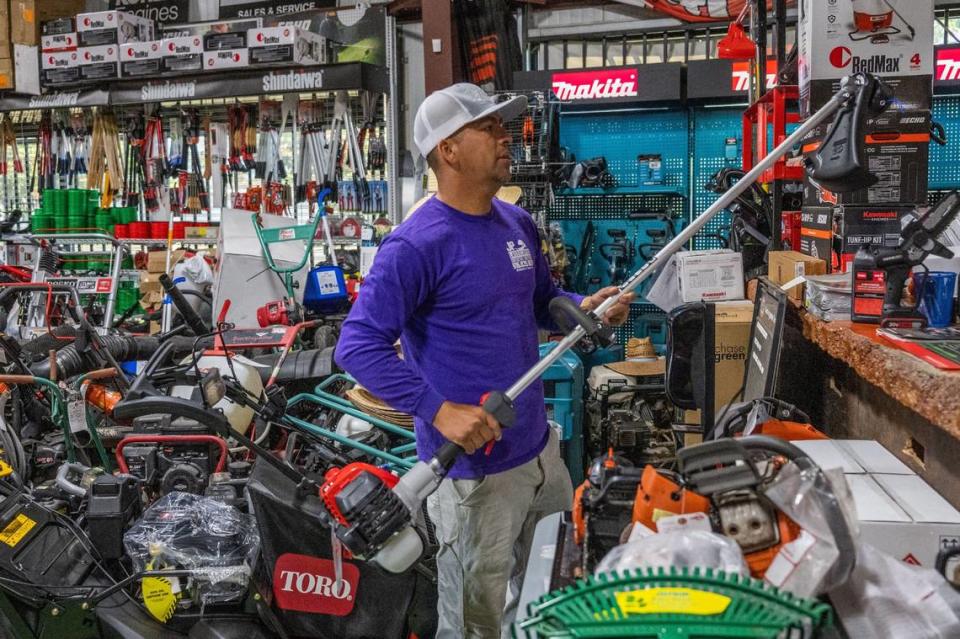
“A lot of the older guys like to have a lot of power and they like to leave very clean,” Mendoza said. “And to them it is just not powerful enough to get the work done.”
Still, electric power hasn’t completely won over Mendoza either.
He enjoys his blower for the noise reduction, but the design isn’t his favorite. Mowers with enough speed for his liking have been a struggle to find. And recently, Mendoza only lasted a few minutes while trying on a new battery-powered backpack blower.
“That thing is so heavy,” Mendoza said. “I wouldn’t purchase that or expect anyone to use that at more than two or three houses a day because of the weight.”
Regardless, he does expect to transition to purely zero-emission landscaping equipment in a few years. He’s not sure about others.
“The word on the street is everyone is stocking up on gas-powered blowers and storing them in their garage…I’m really just waiting for that mower,” Mendoza said. “If they come out with a mower that is quick enough, I will go all electric.”
This story is made possible, in part, with support from the Solutions Journalism Network .

